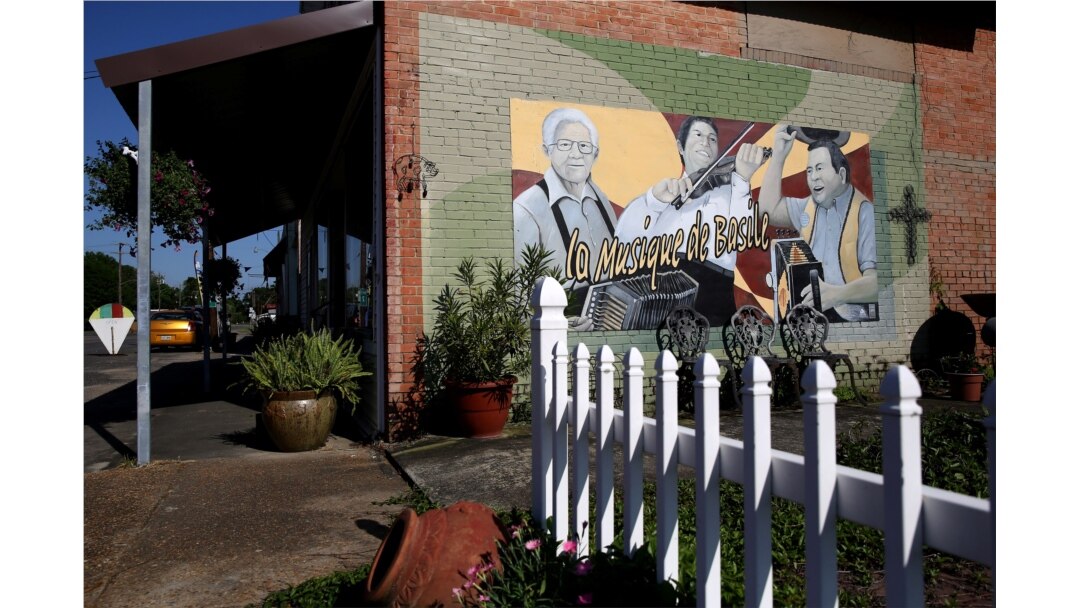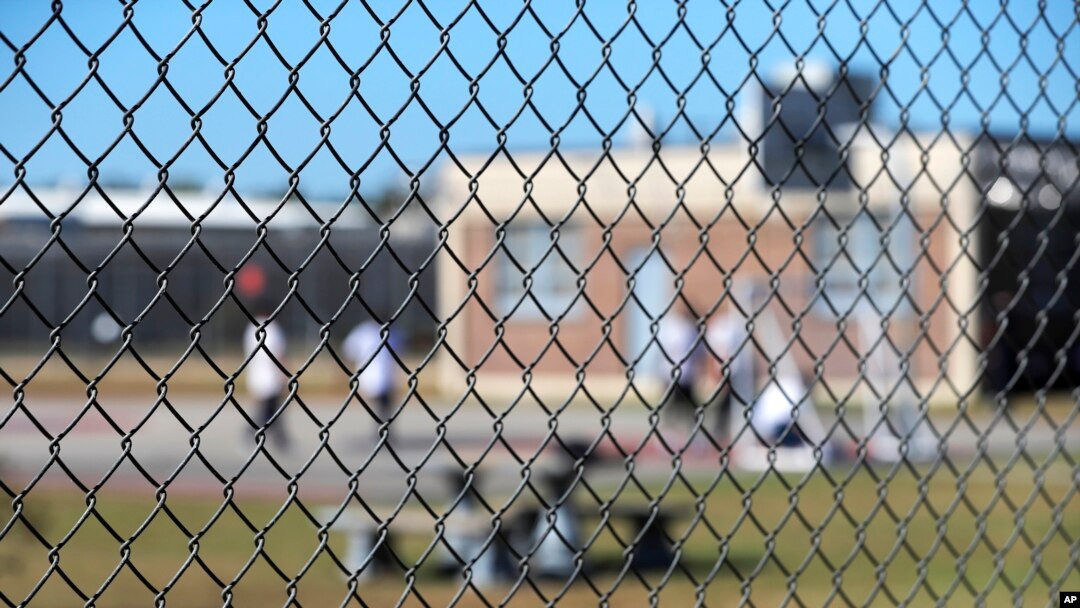A registered nurse who works in a U.S. Immigration and Customs Enforcement (ICE) migrant detention center in rural Louisiana fears the continued movement of detainees between facilities could cause the coronavirus to spread unchecked to untold numbers of people who are isolated from intensive medical care.
The nurse agreed to speak to VOA by phone on the condition of anonymity and without identifying the specific detention facility because he feared he could lose his job for speaking to a reporter.
For its part, ICE insists there are medically valid reasons for detainee transports. The nurse said he had yet to hear them.
“The No. 1 concern that I have is, we’re not getting much information on why ICE continues to move detainees in large numbers from one facility to the other in the midst of a global pandemic,” he said.
If an outbreak were to hit the detention center where he is assigned, the nurse said, “we're not equipped for critical care here. A patient would have to be sent to a hospital if they had severe respiratory symptoms, and the hospitals are already overloaded.” The nurse pointed out that most of the 12 detention centers in Louisiana are in rural areas far from large hospitals.

FILE - A mural is pictured in Basile amid a coronavirus disease outbreak across the state of Louisiana, March 26, 2020.
Louisiana has become a recent hot spot for COVID-19 cases, which health professionals suspect began spreading in the region after crowded Mardi Gras celebrations in New Orleans in late February.
The nurse worries that he and other medical professionals working at ICE facilities won’t have a fighting chance to mitigate the spread of the virus if the agency continues moving migrants from center to center.
“If we got 10 detainees that come up positive in one dorm, and you trace them and they all came from different detention centers within the last two weeks, how are we going to trace this thing?” he asked.
ICE spokesman Bryan Cox told VOA that “movement of persons from one facility to another is part of population management, and one reason for doing so may be to consolidate persons under a medical cohort in one area and general population persons at another.”
ICE: We're following guidelines
In a statement to VOA last month, ICE said it was following guidelines set by the U.S. Centers for Disease Control and Prevention to screen and isolate any detainee who shows symptoms consistent with COVID-19.
Detainees are growing increasingly panicked about their vulnerability to the virus while living in ICE custody. Hunger strikes and other protests are taking place in detention centers across the country, and detainees at the LaSalle processing center in Jena, Louisiana, were recently pepper-sprayed during a briefing at the facility.
As of Wednesday, there were 32 confirmed cases of COVID-19 among detainees in ICE custody across the country. So far, 160 have been released in light of the pandemic, and on Tuesday, Buzzfeed reported that the agency had identified 600 detainees "vulnerable" to the virus for possible release.
Two ICE detainees in Louisiana have tested positive for COVID-19.
SEE ALSO: Trump Uses Coronavirus Crisis to Push his Broader AgendaOn March 27, Fredy Aldana and several dozen other ICE detainees at the Jackson Parish Correctional Center in Jonesboro, Louisiana, began a hunger strike, seeking to be released to family members or sponsors in the United States.
Aldana and others say they are scared and don’t believe that they will receive good medical care if they need it.
"We don't want to die here on the inside. If we die, we want to die with our families," Aldana said in a telephone interview with VOA.
Virus vectors
The hunger strikers worry that, despite the recent protocol for correctional officers to undergo a temperature check before entering the facility, the staff coming in and out could be vectors for the virus. Aldana said he and other detainees have limited access to soap and hand sanitizer.
The 22-year-old from Honduras believes that despite being young, he and many others in detention have compromised immune systems.
“I’ve gotten so many colds and flus in the last year,” he said, which he thinks is because of a poor diet and sleeping close to the 70 other detainees in his dormitory.
Jatwinger Singh, a 29-year-old asylum-seeker who says he is fleeing religious persecution in India, is also at the detention center in Jonesboro, where he says he hasn’t eaten for nearly two weeks. On a phone call from the facility, Singh told VOA he was prepared to continue striking until he and the seven remaining strikers are heard.
He said they are afraid for their lives because the correctional officers do not wear masks or gloves despite moving in and out of the facility each day, and they want the facility staff to be taking more precautions.
“Our first demand is just save our lives. If they fail to save our lives, then please release us because we have our families here,” Singh said.
Aldana said that a detainee with a fever and a headache in his dormitory was recently removed and his bed area was cleaned, but no one else was quarantined and he never found out if the detainee was tested for COVID-19.
The nurse working in the Louisiana detention center said he has seen patients with fevers and body aches who tested negative for the flu and strep throat, but no one in his center has been tested for the coronavirus. He said he’s frustrated because ICE has not communicated a plan for how it will protect employees if there is an outbreak.
“I have a plan for myself to quarantine myself from my family when I know when I’ve come in contact, but how am I supposed to know that if we're not testing? It's frustrating because we don't really have a voice,” he said.
FILE - An U.S. Immigration and Customs Enforcement officer transfers a man in hand and ankle cuffs onto a van during an operation in Escondido, Calif., July 8, 2019.
On March 18, U.S. immigration authorities announced they would temporarily halt enforcement across the United States, except for efforts to deport foreign nationals who have committed crimes or pose a threat to the public. This means that there are fewer apprehensions and therefore fewer new people being introduced into the detention system. Cox, the ICE spokesman, reported that as of March 28, ICE had 35,671 people in custody, compared with the 2019 daily average of 50,165.
Meanwhile, the Southern Poverty Law Center and the American Civil Liberties Union have filed a joint emergency motion asking the government “to immediately conduct parole assessments and reassessments for those who've already been denied parole” so that those who qualify for parole can be released, said Luz Lopez, an attorney at SPLC. She said they are especially concerned for their plaintiffs who “suffer from serious medical conditions.”
The motion against ICE and the Department of Homeland Security was first filed in May 2019 in response to a drop from a 70 percent parole approval rate in 2016 to no asylum-seekers being granted parole in 2019.
No criminal records
“These folks, they are asylum-seekers. They have not done anything wrong; 99 percent do not have criminal records,” Lopez said.
Like many of Lopez’s clients, Aldana and his family sought asylum by turning themselves in at the U.S. border. He was separated from his pregnant wife and 2-year-old daughter and has been denied parole throughout the 14 months that he’s been in detention in Jackson Parish. Aldana’s family is waiting out the asylum process while living with relatives in Seattle.
Aldana gave up on the hunger strike after a week when he saw another striker faint in his dormitory, and he was afraid that continuing the strike would further compromise his health.
“I have my family to think about. I’ve never met my daughter, who is 8 months old now,” he said.


